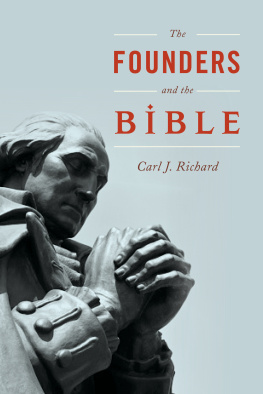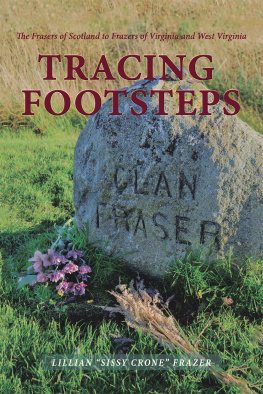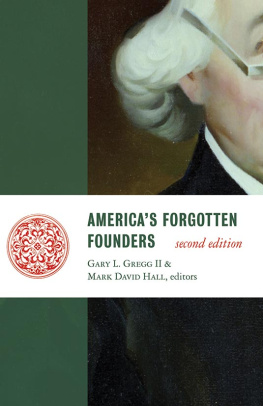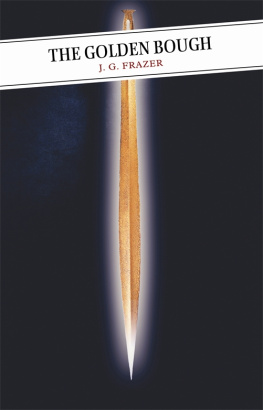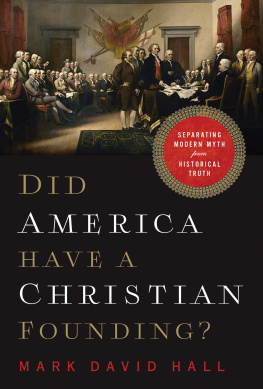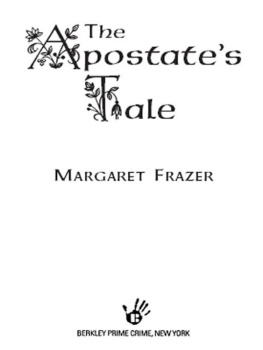Gregg L. Frazer - The Religious Beliefs of Americas Founders: Reason, Revelation, and Revolution
Here you can read online Gregg L. Frazer - The Religious Beliefs of Americas Founders: Reason, Revelation, and Revolution full text of the book (entire story) in english for free. Download pdf and epub, get meaning, cover and reviews about this ebook. year: 2012, publisher: University Press of Kansas, genre: Religion. Description of the work, (preface) as well as reviews are available. Best literature library LitArk.com created for fans of good reading and offers a wide selection of genres:
Romance novel
Science fiction
Adventure
Detective
Science
History
Home and family
Prose
Art
Politics
Computer
Non-fiction
Religion
Business
Children
Humor
Choose a favorite category and find really read worthwhile books. Enjoy immersion in the world of imagination, feel the emotions of the characters or learn something new for yourself, make an fascinating discovery.

- Book:The Religious Beliefs of Americas Founders: Reason, Revelation, and Revolution
- Author:
- Publisher:University Press of Kansas
- Genre:
- Year:2012
- Rating:5 / 5
- Favourites:Add to favourites
- Your mark:
The Religious Beliefs of Americas Founders: Reason, Revelation, and Revolution: summary, description and annotation
We offer to read an annotation, description, summary or preface (depends on what the author of the book "The Religious Beliefs of Americas Founders: Reason, Revelation, and Revolution" wrote himself). If you haven't found the necessary information about the book — write in the comments, we will try to find it.
Going beyond church attendance or public pronouncements made for political ends, Frazer scrutinizes the Founders candid declarations regarding religion found in their private writings. Distilling decades of research, he contends that these men were neither Christian nor deist but rather adherents of a system he labels theistic rationalism, a hybrid belief system that combined elements of natural religion, Protestantism, and reasonwith reason the decisive element.
Frazer explains how this theological middle ground developed, what its core beliefs were, and how they were reflected in the thought of eight Founders: John Adams, Thomas Jefferson, Benjamin Franklin, James Wilson, Gouverneur Morris, James Madison, Alexander Hamilton, and George Washington. He argues convincingly that Congregationalist Adams is the clearest example of theistic rationalism; that presumed deists Jefferson and Franklin are less secular than supposed; and that even the famously taciturn Washington adheres to this theology. He also shows that the Founders held genuinely religious beliefs that aligned with morality, republican government, natural rights, science, and progress.
Frazers careful explication helps readers better understand the case for revolutionary recruitment, the religious references in the Declaration of Independence, and the religious elements-and lack thereof-in the Constitution. He also reveals how influential clergymen, backing their theology of theistic rationalism with reinterpreted Scripture, preached and published liberal democratic theory to justify rebellion.
Deftly blending history, religion, and political thought, Frazer succeeds in showing that the American experiment was neither a wholly secular venture nor an attempt to create a Christian nation founded on biblical principles. By showcasing the actual approach taken by these key Founders, he suggests a viable solution to the twenty-first-century standoff over the relationship between church and stateand challenges partisans on both sides to articulate their visions for America on their own merits without holding the Founders hostage to positions they never held.
Gregg L. Frazer: author's other books
Who wrote The Religious Beliefs of Americas Founders: Reason, Revelation, and Revolution? Find out the surname, the name of the author of the book and a list of all author's works by series.

